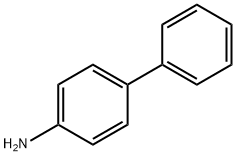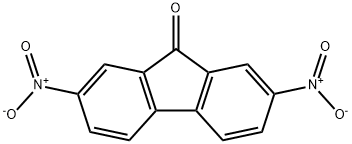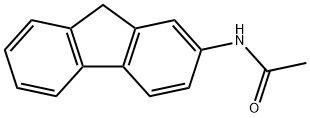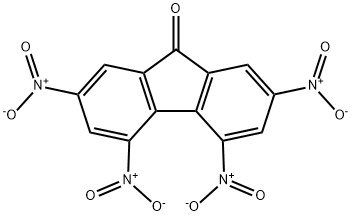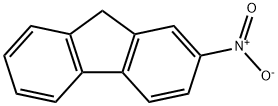A0824012
4-Aminobiphenyl , 1000μg/ml,inPurgeandTrapMethanol , 92-67-1
Synonym(s):
Biphenyl-4-ylamine;4-Aminodiphenyl;4-Phenylaniline;Xenylamine;4-Biphenylylamine
CAS NO.:92-67-1
Empirical Formula: C12H11N
Molecular Weight: 169.22
MDL number: MFCD00007879
EINECS: 202-177-1
Update time: 2022-07-08
PRODUCT Properties
| Melting point: | 52-54 °C(lit.) |
| Boiling point: | 191 °C15 mm Hg(lit.) |
| Density | 1.1154 (rough estimate) |
| vapor pressure | 6 x 10-5 mmHg at 20–30 °C (quoted, Mercer et al., 1990) |
| refractive index | 1.5785 (estimate) |
| Flash point: | >110°C |
| storage temp. | -20°C Freezer |
| solubility | Soluble in Dichloromethane, DMSO and Methanol |
| pka | 4.35(at 18℃) |
| form | powder |
| color | Brown to Dark Yellow |
| Water Solubility | 842 mg/L at 20–30 °C (quoted, Mercer et al., 1990) |
| Merck | 13,1235 |
| BRN | 386533 |
| Henry's Law Constant | (x 1010 atm?m3/mol):
3.89 at 25 °C (calculated, Mercer et al., 1990) |
| Stability: | Stable, but slowly reacts with oxygen in the air. Combustible. Incompatible with strong oxidizing agents, acids, acid anhydrides, acid chlorides. |
| InChIKey | DMVOXQPQNTYEKQ-UHFFFAOYSA-N |
| CAS DataBase Reference | 92-67-1(CAS DataBase Reference) |
| IARC | 1 (Vol. 1, Sup 7, 99, 100F) 2012 |
| NIST Chemistry Reference | 4-Aminobiphenyl(92-67-1) |
| EPA Substance Registry System | 4-Aminobiphenyl (92-67-1) |
Description and Uses
4-Aminobiphenyl is an aromatic amine (arylamine) that exists at room temperature as a colorless crystalline solid with a floral odor. It is slightly soluble in cold water, but readily soluble in hot water. It is soluble in ethanol, ether, acetone, chloroform, and lipids. It oxidizes in air and emits toxic fumes when heated to decomposition (Akron 2009).
Previously used as a rubber antioxidant; no longer produced on a commercial scale
Safety
| Symbol(GHS) |   GHS07,GHS08 |
| Signal word | Danger |
| Hazard statements | H302-H350 |
| Precautionary statements | P201-P202-P264-P270-P301+P312-P308+P313 |
| Hazard Codes | T,Xn |
| Risk Statements | 45-22-36/37/38-20/21/22 |
| Safety Statements | 53-45-36-26 |
| RIDADR | UN 3077 9/PG 3 |
| WGK Germany | 3 |
| RTECS | DU8925000 |
| Autoignition Temperature | 842 °F |
| TSCA | Yes |
| HazardClass | 6.1(a) |
| PackingGroup | I |
| HS Code | 29214990 |
| Hazardous Substances Data | 92-67-1(Hazardous Substances Data) |
| Toxicity | Acute oral LD50 for rats 200 mg/kg, mice 50 mg/kg (quoted, Verschueren, 1983). |

